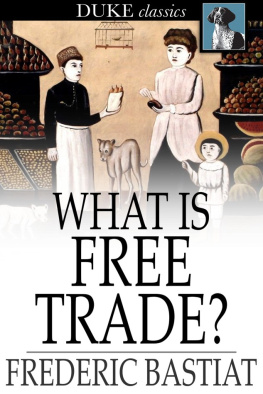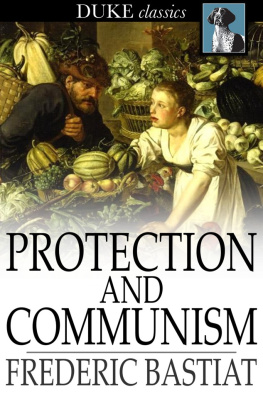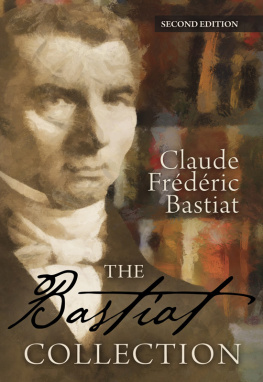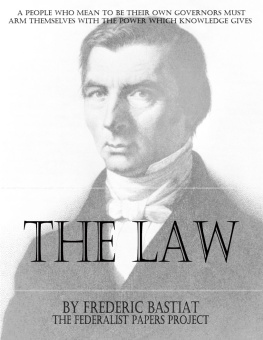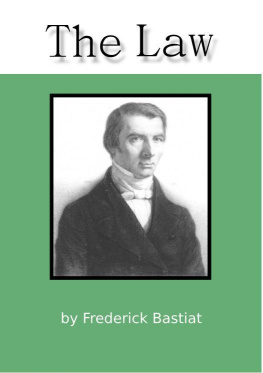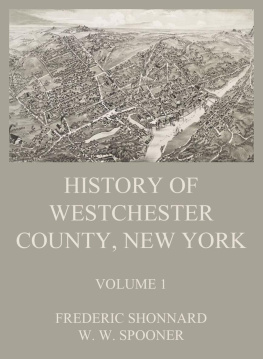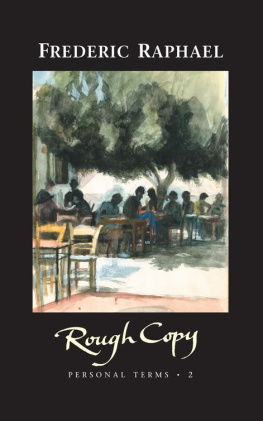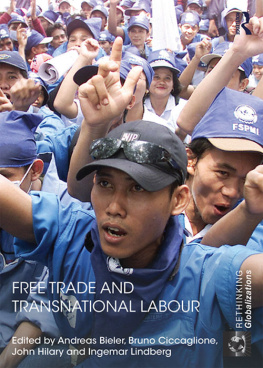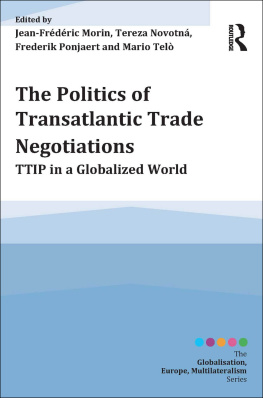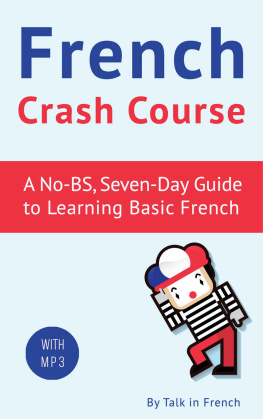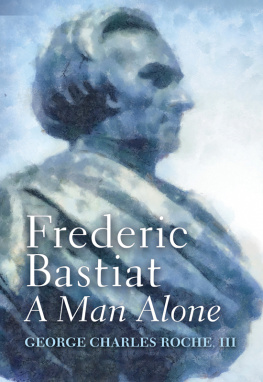WHAT IS FREE TRADE?
AN ADAPTATION OF FREDERIC BASTIAT'S "SOPHISMES ECONOMIQUES"
* * *
FREDERIC BASTIAT
Translated by
ALEXANDER DEL MAR
*
What Is Free Trade?
An Adaptation of Frederic Bastiat's "Sophismes Economiques"
First published in 1867
ISBN 978-1-62013-814-4
Duke Classics
2014 Duke Classics and its licensors. All rights reserved.
While every effort has been used to ensure the accuracy and reliability of the information contained in this edition, Duke Classics does not assume liability or responsibility for any errors or omissions in this book. Duke Classics does not accept responsibility for loss suffered as a result of reliance upon the accuracy or currency of information contained in this book.
Contents
*
Introduction
*
Years ago I could not rid my mind of the notion that Free Trade meantsome cunning policy of British statesmen designed to subject the worldto British interests. Coming across Bastiat's inimitable SophismesEconomiques I learnt to my surprise that there were Frenchmen alsowho advocated Free Trade, and deplored the mischiefs of the ProtectivePolicy. This made me examine the subject, and think a good deal uponit; and the result of this thought was the unalterable conviction Inow holda conviction that harmonizes with every noble belief thatour race entertains; with Civil and Religious Freedom for All,regardless of race or color; with the Harmony of God's works; withPeace and Goodwill to all Mankind. That conviction is this: that tomake taxation the incident of protection to special interests, andthose engaged in them, is robbery to the rest of the community, andsubversive of National Morality and National Prosperity. I believethat taxes are necessary for the support of government, I believe theymust be raised by levy, I even believe that some customs taxes may bemore practicable and economical than some internal taxes; but I amentirely opposed to making anything the object of taxation but therevenue required by government for its economical maintenance.
I do not espouse Free Trade because it is British, as some suppose itto be. Independent of other things, that would rather set me againstit than otherwise, because generally those things which best fitEuropean society ill befit our societythe structure of each being sodifferent. Free Trade is no more British than any other kind offreedom: indeed, Great Britain has only followed quite older examplesin adopting it, as for instance the republics of Venice and Holland,both of which countries owed their extraordinary prosperity to thefact of their having set the example of relaxing certain absurdthough time-honored restrictions on commerce. I espouse Free Tradebecause it is just, it is unselfish, and it is profitable.
For these reasons have I, a Worker, deeply interested in the welfareof the fellow-workers who are my countrymen, lent to Truth and Justicewhat little aid I could, by adapting Bastiat's keen and cogent Essayto the wants of readers on this side of the Atlantic.
EMILE WALTER, the Worker.
NEW YORK, 1866.
Chapter I - Plenty and Scarcity
*
Which is better for man and for societyabundance or scarcity?
What! Can such a question be asked? Has it ever been pretended, is itpossible to maintain, that scarcity is better than plenty?
Yes: not only has it been maintained, but it is still maintained.Congress says so; many of the newspapers (now happily diminishing innumber) say so; a large portion of the public say so; indeed, thecity theory is by far the more popular one of the two.
Has not Congress passed laws which prohibit the importation of foreignproductions by the maintenance of excessive duties? Does not theTribune maintain that it is advantageous to limit the supply of ironmanufactures and cotton fabrics, by restraining any one from bringingthem to market, but the manufacturers in New England and Pennsylvania?Do we not hear it complained every day: Our importations are toolarge; We are buying too much from abroad? Is there not anAssociation of Ladies, who, though they have not kept their promise,still, promised each other not to wear any clothing which wasmanufactured in other countries?
Now tariffs can only raise prices by diminishing the quantity of goodsoffered for sale. Therefore, statesmen, editors, and the publicgenerally, believe that scarcity is better than abundance.
But why is this; why should men be so blind as to maintain thatscarcity is better than plenty?
Because they look at price, but forget quantity.
But let us see.
A man becomes rich in proportion to the remunerative nature of hislabor; that is to say, in proportion as he sells his produce at ahigh price. The price of his produce is high in proportion to itsscarcity. It is plain, then, that, so far as regards him at least,scarcity enriches him. Applying, in turn, this manner of reasoning toeach class of laborers individually, the scarcity theory is deducedfrom it. To put this theory into practice, and in order to favor eachclass of labor, an artificial scarcity is produced in every kind ofproduce by prohibitory tariffs, by restrictive laws, by monopolies,and by other analogous measures.
In the same manner it is observed that when an article is abundant, itbrings a small price. The gains of the producer are, of course, less.If this is the case with all produce, all producers are then poor.Abundance, then, ruins society; and as any strong conviction willalways seek to force itself into practice, we see the laws of thecountry struggling to prevent abundance.
Now, what is the defect in this argument? Something tells us that itmust be wrong; but where is it wrong? Is it false? No. And yet it iswrong? Yes. But how? It is incomplete.
Man produces in order to consume. He is at once producer and consumer.The argument given above, considers him only under the first point ofview. Let us look at him in the second character, and the conclusionwill be different. We may say:
The consumer is rich in proportion as he buys at a low price. Hebuys at a low price in proportion to the abundance of the articles indemand; abundance, then, enriches him. This reasoning, extended toall consumers, must lead to the theory of abundance.
Which theory is right?
Can we hesitate to say? Suppose that by following out the scarcitytheory, suppose that through prohibitions and restrictions we werecompelled not only to make our own iron, but to grow our own coffee;in short, to obtain everything with difficulty and great outlay oflabor. We then take an account of stock and see what our savings are.
Afterward, to test the other theory, suppose we remove the duties oniron, the duties on coffee, and the duties on everything else, so thatwe shall obtain everything with as little difficulty and outlay oflabor as possible. If we then take an account of stock, is it notcertain that we shall find more iron in the country, more coffee, moreeverything else?
Choose then, fellow-countrymen, between scarcity and abundance,between much and little, between Protection and Free Trade. You nowknow which theory is the right one, for you know the fruits they eachbear.
But, it will be answered, if we are inundated with foreign goods andproduce, our specie, our precious product of California, our dollars,will leave the country.

